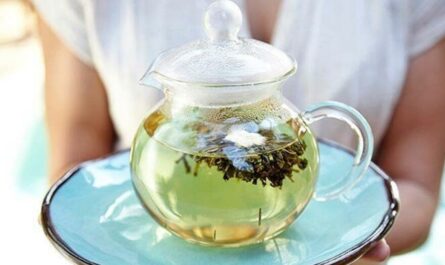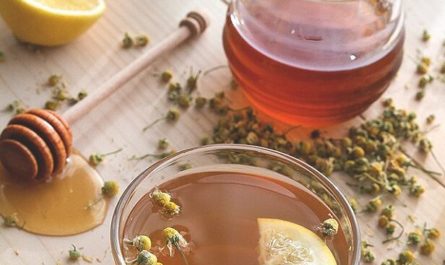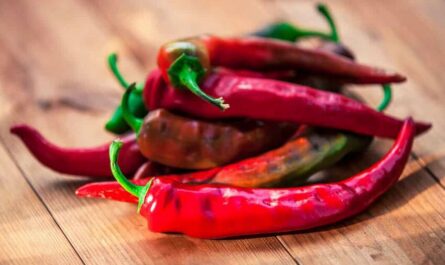Are you looking for a natural way to support your weight loss journey? Detox tea has gained popularity in recent years. These special blends contain ingredients that can boost metabolism, burn fat, and flush out toxins. When incorporated into a balanced diet and fitness routine, it can help reduce bloating and promote overall health.
However, with so many options available on the market, it can be overwhelming to choose the best detox tea for your needs. To help you navigate the world of detox teas, we’ve compiled a list of the 16 best detox tea for weight loss. These teas are not only delicious but also packed with nutrients and antioxidants.
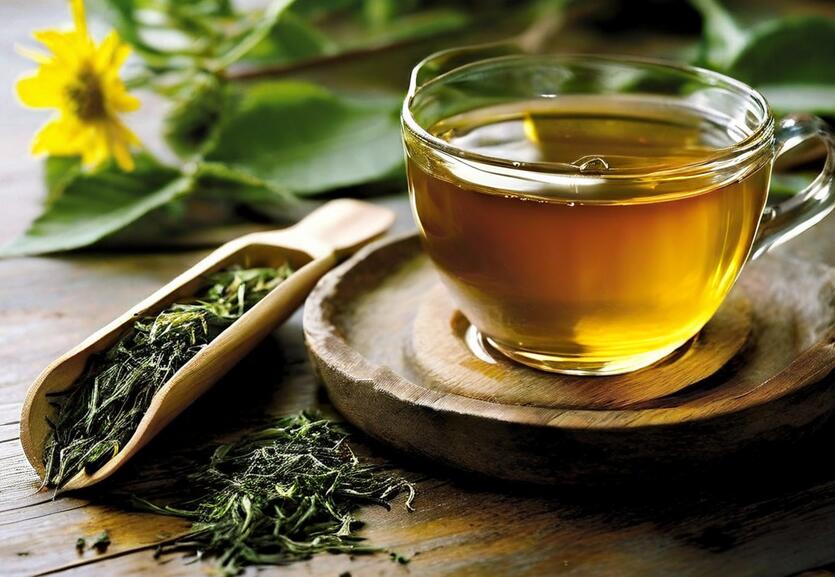
16 Amazing Detox Tea for Weight Loss
1. Green Tea
Green tea is perhaps the most well-known and researched detox tea for weight loss. It’s made from the unoxidized leaves of the Camellia sinensis plant and is loaded with beneficial compounds called catechins. The most potent catechin in green tea is epigallocatechin gallate (EGCG). It can help boost metabolism and increase fat burning.
Studies have found that drinking green tea regularly can help reduce body weight, body fat, and waist circumference. One study in particular showed that participants who consumed green tea extract for 12 weeks lost an average of 2.9 pounds more than the control group.
To maximize the weight loss benefits of green tea, opt for high-quality loose-leaf tea rather than tea bags. Steep the leaves in hot water for 3-5 minutes to extract the most catechins. You can drink green tea hot or iced. You can also add a slice of lemon for an extra boost of flavor and antioxidants.
2. Oolong Tea
Oolong tea is a traditional Chinese tea that’s partially oxidized. This places it somewhere between green and black tea in terms of processing. It contains many of the same beneficial compounds as green tea, including catechins and polyphenols. However, oolong tea also undergoes a unique process that alters its chemical composition and flavor profile.
Research suggests that oolong tea may be particularly effective for weight loss. One study found that women who drank oolong tea for six weeks had a greater decrease in body fat.
In addition, oolong tea also contains caffeine, which can provide a mild energy boost and suppress appetite. To brew oolong tea, steep the leaves in hot water for 2-5 minutes. You can re-steep the leaves multiple times to extract more flavor and nutrients.
3. Pu-erh Tea
Pu-erh tea is a unique type of fermented tea that originates from the Yunnan province of China. It’s made from the leaves of the Camellia sinensis plant.
Studies have shown that pu-erh tea can help reduce body weight, body mass index, and visceral fat accumulation. One study, in particular, found that men who drank pu-erh tea for three months had a greater decrease in body fat percentage.
To maximize the weight loss effects of pu-erh tea, it’s recommended to drink a cup one hour after meals. This can help metabolize excess fats and carbohydrates consumed during the meal. However, it’s best to avoid drinking pu-erh tea on an empty stomach, as the fermentation process can increase appetite and lead to overeating.
4. White Tea
White tea is the least processed of all true teas. It is made from the young buds and leaves of the Camellia sinensis plant. It has a delicate flavor and pale color and is prized for its high antioxidant content. One study found that white tea extract was able to inhibit the formation of new fat cells and stimulate lipolysis, the breakdown of stored fats.
White tea also contains caffeine, which can boost energy expenditure and promote weight loss. However, white tea has a lower caffeine content compared to other teas. This makes it a good choice for those who are sensitive to stimulants.
To brew white tea, use water that is just below boiling point and steep the leaves for 1-3 minutes. Be careful not to over-steep, as this can result in a bitter taste. White tea is best consumed plain, without any added sweeteners or milk.
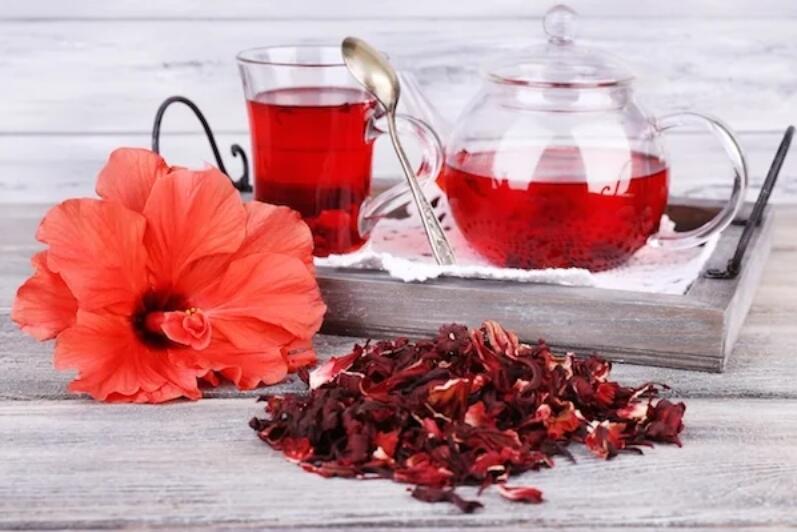
5. Hibiscus Tea
Hibiscus tea is a vibrant herbal tea made from the dried calyces of the hibiscus flower. It has a tart, cranberry-like flavor and a deep red color. Hibiscus tea is naturally caffeine-free and rich in antioxidants, particularly anthocyanins and polyphenols. This can help inhibit the absorption of fats as well as reduce inflammation in the body.
Hibiscus tea is also a natural diuretic, meaning it can help reduce water retention and bloating. This can be especially beneficial for those who feel puffy or bloated due to excess salt intake or hormonal changes.
To make hibiscus tea, steep the dried flowers in boiling water for 5-10 minutes. You can drink it hot or iced, and add a touch of honey if desired.
6. Rooibos Tea
Rooibos tea is a caffeine-free herbal tea that comes from the South African red bush. It has a smooth, nutty flavor and a reddish-brown color. Rooibos tea is rich in antioxidants, particularly aspalathin. It can regulate blood sugar levels and reduce stress hormones that can trigger hunger and fat storage.
One of the unique benefits of rooibos tea is its natural sweetness, which comes from a compound called pinitol. This means you can enjoy the tea without needing to add any sugar or sweeteners. This makes it a great choice for those watching their calorie intake.
To brew rooibos tea, steep the leaves in boiling water for 5-10 minutes. You can enjoy it hot or iced, and even add a cinnamon stick for extra flavor.
7. Ginger Tea
Ginger is a spicy root with a long history of use in traditional medicine. It’s known for its ability to soothe digestive issues, reduce inflammation, and boost immunity. But did you know that ginger tea can also support weight loss?
Studies have shown that ginger has thermogenic properties. This means it can increase heat production in the body and boost metabolism. Ginger may also help reduce feelings of hunger and increase satiety, making it easier to stick to a reduced-calorie diet.
To make ginger tea, simply steep fresh ginger slices in hot water for 5-10 minutes. You can also add a slice of lemon or a dash of cayenne pepper for an extra kick. Ginger tea is naturally caffeine-free, so you can enjoy it any time of day without worrying about disrupting your sleep.
8. Dandelion Root Tea
This tea is made from the roasted roots of the dandelion plant. Dandelion root is a natural diuretic, meaning it can help reduce water retention and bloating. It’s also rich in potassium, an electrolyte that helps regulate fluid balance in the body.
In addition to its diuretic properties, dandelion root tea may also aid in weight loss by supporting liver function and digestion. Dandelion root tea has a rich, earthy flavor that is similar to coffee. In fact, it’s often used as a coffee substitute for those looking to cut back on caffeine.
To make dandelion root tea, steep 1-2 teaspoons of roasted dandelion root in a cup of hot water for 10-15 minutes. You can add a bit of milk or honey if desired.
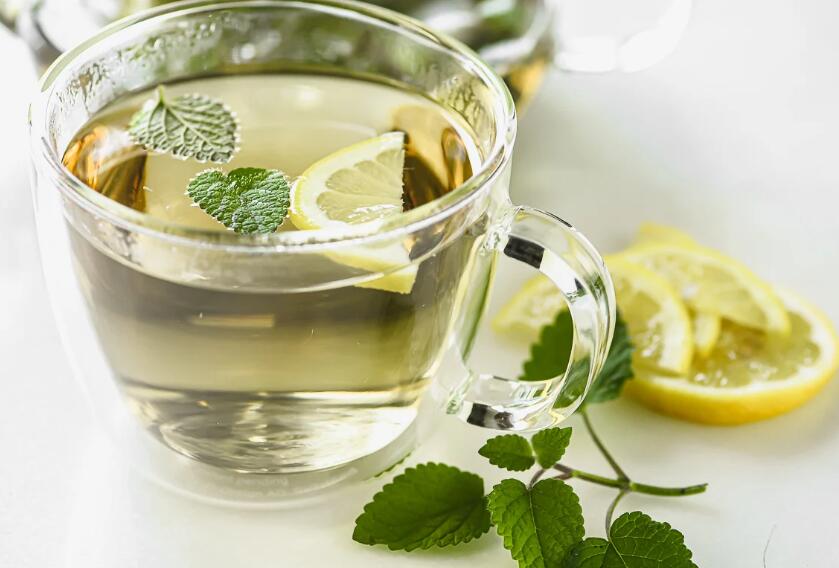
9. Lemon Balm Tea
Lemon balm is a fragrant herb in the mint family that has a mild, lemony scent and flavor. It’s often used to promote relaxation and relieve stress, but may also have benefits for weight loss. Lemon balm contains compounds that can help reduce inflammation and regulate blood sugar levels.
High blood sugar can lead to insulin resistance and increased fat storage. So keeping it in check is important for weight management. Lemon balm may help improve insulin sensitivity and reduce blood sugar spikes after meals.
To make lemon balm tea, steep 1-2 teaspoons of dried lemon balm leaves in a cup of hot water for 5-10 minutes. You can also use fresh leaves if you have them available. Lemon balm tea is naturally sweet and doesn’t require any added sweeteners.
10. Rose Tea
Rose tea is made from the fragrant petals and buds of the rose flower. It has a delicate floral flavor and aroma that is both soothing and uplifting. Rose tea is rich in antioxidants, particularly polyphenols.
It can help protect against oxidative stress and inflammation. In addition, Rose tea may work by inhibiting the absorption of fats and carbohydrates in the gut.
Rose tea is also a natural mild laxative, which can help promote regular bowel movements and reduce bloating. To make rose tea, steep 1-2 teaspoons of dried rose petals in a cup of hot water for 5-10 minutes.
You can also add fresh rose petals if you have them available. Rose tea is naturally sweet and fragrant, so you don’t need to add any sweeteners.
11. Fennel Tea
Fennel is a flowering plant in the carrot family that has a sweet, licorice-like flavor. The seeds of the fennel plant are often used in cooking and herbal medicine. Fennel tea is a powerful digestive aid that can help relieve bloating, gas, and constipation.
Fennel contains compounds that can stimulate the production of digestive enzymes and bile. This can help break down fats and other nutrients. Fennel tea may also help suppress appetite and boost metabolism. This makes it easier to stick to a reduced-calorie diet.
To make fennel tea, crush 1-2 teaspoons of fennel seeds and steep them in a cup of hot water for 10-15 minutes. You can also add fresh fennel leaves or slices of fennel bulb for added flavor. Fennel tea has a slightly sweet, licorice-like taste that is refreshing and soothing.
12. Lemongrass Tea
Lemongrass is a tropical plant that is commonly used in Southeast Asian cuisine. It has a citrusy, slightly sweet flavor and aroma that is both refreshing and invigorating. Lemongrass tea is a natural diuretic that can help reduce water retention and bloating.
In addition, Lemongrass contains compounds that can stimulate the production of urine and help flush out excess fluids and toxins from the body. Lemongrass tea may also help boost metabolism and increase fat burning.
One study found that drinking lemongrass tea for 30 days resulted in significant reductions in body weight and body fat percentage.
To make lemongrass tea, steep 1-2 teaspoons of dried lemongrass or a few fresh stalks in a cup of hot water for 5-10 minutes. You can also add a slice of ginger or a squeeze of lemon for added flavor and benefits.
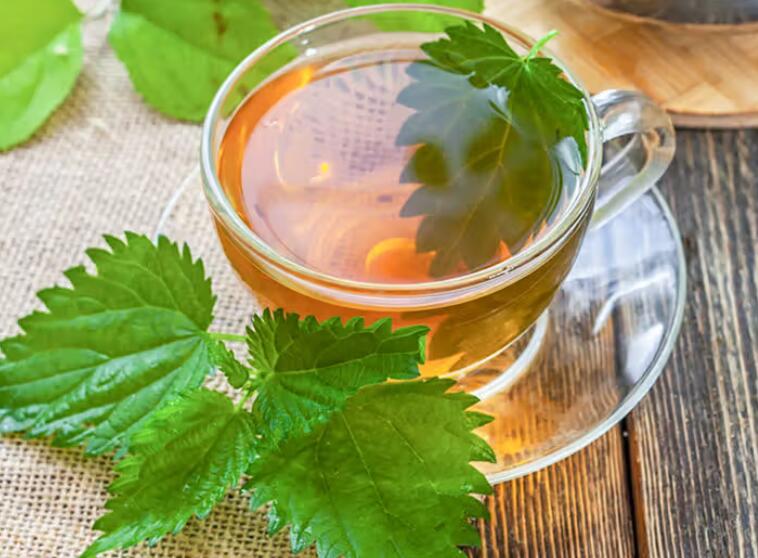
13. Nettle Tea
Nettle, also known as stinging nettle, is a nutrient-dense herb that has been used for centuries in traditional medicine. It has a slightly bitter, spinach-like flavor and is rich in vitamins, minerals, and antioxidants.
In addition, Nettle contains compounds that can stimulate the kidneys and promote urine production, helping to reduce water retention and bloating.
To make nettle tea, steep 1-2 teaspoons of dried nettle leaves in a cup of hot water for 5-10 minutes. You can also use fresh nettle leaves if you have them available. But be sure to wear gloves when handling them as they can cause a stinging sensation on the skin. Nettle tea has a slightly bitter, earthy flavor that can be an acquired taste for some.
14. Sage Tea
Sage is an aromatic herb that is commonly used in cooking and traditional medicine. It has a slightly peppery, earthy flavor and aroma that is both comforting and invigorating. Sage tea may have benefits for weight loss thanks to its ability to regulate blood sugar levels.
Sage contains compounds that can help improve insulin sensitivity and reduce blood sugar spikes after meals. In addition, Sage tea may also help reduce inflammation in the body. This can contribute to weight gain and metabolic disorders.
To make sage tea, steep 1-2 teaspoons of dried sage leaves in a cup of hot water for 5-10 minutes. You can also use fresh sage leaves if you have them available. Sage tea has a slightly bitter, earthy flavor that can be an acquired taste for some. You can also add a bit of honey or lemon if desired.
15. Mint Tea
Mint is a refreshing herb that is commonly used in cooking, aromatherapy, and herbal medicine. It has a cool, invigorating flavor and aroma that can help boost energy and mental clarity.
Mint contains compounds that can help reduce feelings of hunger and increase feelings of fullness. This makes it easier to stick to a reduced-calorie diet. Mint tea may also help soothe digestive issues like bloating and gas.
To make mint tea, steep 1-2 teaspoons of dried mint leaves or a few fresh sprigs in a cup of hot water for 5-10 minutes. You can use any type of mint, such as peppermint or spearmint, depending on your taste preferences.
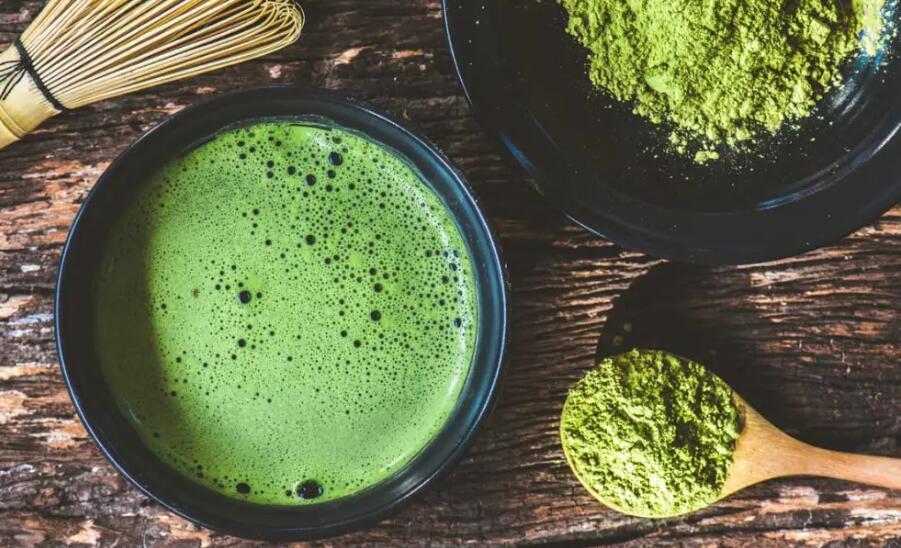
16. Matcha Tea
Matcha is a type of green tea that is made from finely ground tea leaves. It has a vibrant green color and a slightly sweet, umami flavor that is both refreshing and satisfying. Matcha tea is rich in antioxidants, particularly EGCG.
Unlike other teas where you steep the leaves and discard them, with matcha you consume the entire leaf. This means you get a higher concentration of beneficial compounds like EGCG. Matcha also contains a unique amino acid called L-theanine. It can promote relaxation and reduce stress without causing drowsiness.
To make matcha tea, sift 1-2 teaspoons of matcha powder into a cup and add a small amount of hot water. You can use a bamboo whisk to mix the powder and water into a smooth paste, then add more hot water and whisk until frothy. Matcha tea is traditionally consumed plain, but you can add a bit of honey or milk if desired.
The Bottom Line
Incorporating detox teas into your weight loss plan can be a tasty and effective way to support your goals. These teas contain compounds that can suppress appetite and aid digestion. However, it’s important to remember that detox teas are not a magic bullet for weight loss.
To see lasting results, you need to combine detox teas with a balanced diet and regular exercise. Aim to eat plenty of whole, nutrient-dense foods like fruits, vegetables, lean proteins, and healthy fats. Avoid processed and high-calorie foods that can sabotage your weight loss efforts. In addition, make sure to stay hydrated by drinking plenty of water throughout the day.
When selecting detox teas, look for high-quality, organic brands that use pure ingredients without any artificial additives or preservatives. Avoid teas that contain laxatives or high amounts of caffeine. Because these teas can cause unpleasant side effects like jitters, anxiety, and digestive issues.




